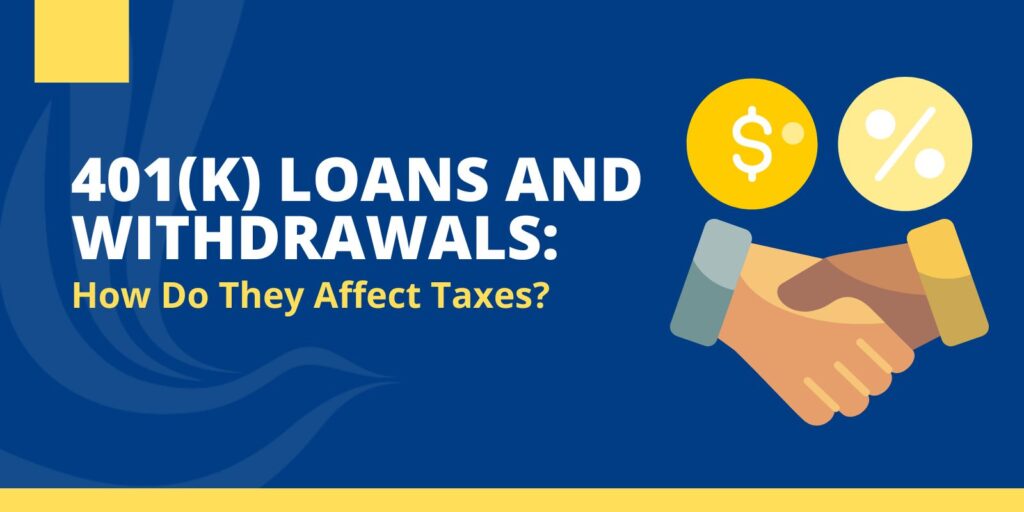Although it is not recommended, sometimes borrowing from your 401(k) savings is necessary to cover unexpected expenses or hardships. When it comes to accessing funds from your 401(k) account before retirement age, you generally have two options. You can take out a loan or make a withdrawal. Each option has distinct characteristics and tax implications that can significantly affect your financial planning. Here’s a comprehensive look at the differences between 401(k) loans and 401(k) withdrawals, with a focus on how each impacts your taxes.
401(k) Loans
A 401(k) loan allows you to borrow money from your retirement savings. However, you must repay it with interest within a specified period.
How Much Can I Borrow?
Typically, the maximum amount that can be borrowed is 50% of your vested account balance, up to $50,000 in a 12-month period. However, since 401(k) accounts are distributed through employers, each plan can come with different rules and limitations.
What are the Tax Implications?
Since this option is considered a loan, the funds will need to be returned to the account. The loan period is usually within 5 years. This also means that no taxes or penalties will need to be paid on the loan because the borrower is expected to return the money. Borrowers should keep in mind that this option does come at a price as the loan will require paying interest. Interest paid will go back into the account. While this may seem beneficial, it’s important to note that the interest is paid with after-tax dollars, which will be taxed again upon retirement withdrawal. In addition, there’s an opportunity cost because the borrowed amount is not invested during the loan period, which could reduce your account’s growth potential.
Beware of Missed Payments and Leaving Your Employer
Some borrowers may wonder what happens if you miss a payment or even default on the loan. The good news is your credit score will not be impacted. The only exception to this is if you leave your current job. If you fail to repay the loan as per the terms (e.g., within five years or upon leaving your job), the outstanding loan balance is treated as a distribution. This means it becomes subject to ordinary income tax and, if you’re under 59½, a 10% early withdrawal penalty.
Since a 401(k) account is an employment perk, the benefits are withdrawn once you are separated from the employer. Sometimes, borrowers are required to repay the loan within a short period of time after termination, and failure to do so can result in not only a defaulted loan but taxes and penalties.
401(k) Withdrawals
A 401(k) withdrawal involves permanently removing money from your retirement account. Withdrawing from your 401(k) once you reach age 59½ won’t result in any tax penalties. However, some early withdrawals will. On the other hand, some will not.
What If I Withdraw Early?
If you withdraw funds before reaching the age of 59½, you typically face a 10% early withdrawal penalty in addition to regular income taxes. However, there are certain exceptions, such as substantial medical expenses or permanent disability. These exceptions can waive this penalty.
What If I Withdraw Late?
Starting at age 72, the IRS mandates required minimum distributions (RMDs) from your 401(k). Failing to take RMDs can result in a substantial penalty, equal to 50% of the amount that should have been withdrawn. So, don’t be too early with withdrawals but don’t be late either.
What If I Withdraw Due to Hardship?
If you qualify for a hardship withdrawal, you may avoid the 10% penalty, but the amount is still subject to regular income tax. Some examples of hardship that the IRS deem a 401(k) withdrawal an acceptable form of financial relief are:
- Medical expenses
- Foreclosure
- Tuition payments
- Funeral expenses
- Purchase or repair of primary residence
- Total and permanent disability
How Are Withdrawals Taxed?
Withdrawals from a traditional 401(k) are subject to federal and state income tax. The amount withdrawn is added to your gross income for the year, which can potentially push you into a higher tax bracket.
Tax Relief for 401(k) Account Holders
Borrowing from your 401(k) should not be your first choice for immediate funds. Instead, borrowers can use their HSA savings for medical expenses and regular savings and emergency funds for other expenses. However, if you absolutely must use your retirement savings, be sure to understand your options. Deciding between a 401(k) loan and a 401(k) withdrawal requires careful consideration of your financial needs and the tax implications of each option. Loans can provide a tax-efficient way to access funds without immediate penalties, but they require disciplined repayment to avoid tax consequences. Withdrawals offer quick access to cash but come with significant tax liabilities and potential penalties, especially if taken before retirement age. Optima Tax Relief has over a decade of experience helping taxpayers with tough tax situations.
If You Need Tax Help, Contact Us Today for a Free Consultation
Publisher: Source link











